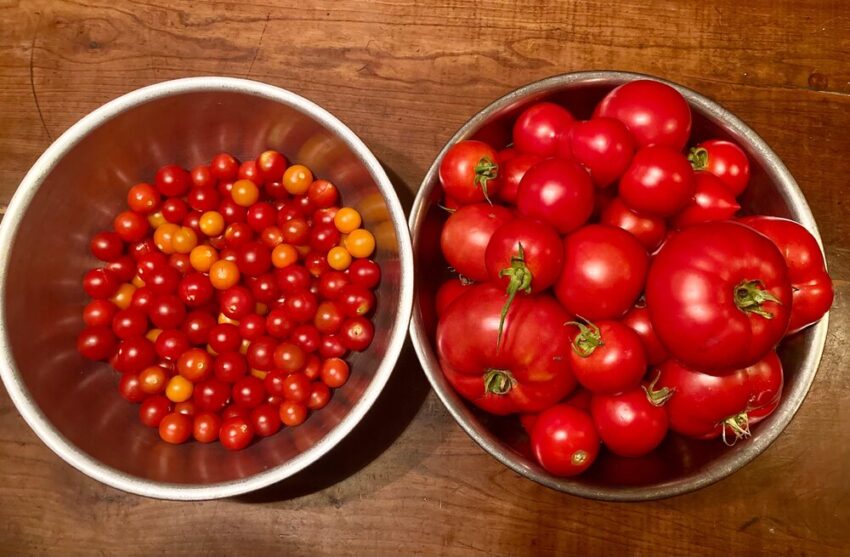Driving down our dirt road I am beginning to see the first signs of leaves turning. At first one puts it down to only the weakened maples beginning to change, but then I started noticing tinges of orange and yellow dotting entire hillsides.
At home and on the farm it is the busy season. We are waiting for the wagon to bring our winter hay for the sheep. We’ll push the hay elevator into place and escalate bales up into our storage space above the barn. Just before that happens we will revel in the open space that is left at the end of summer. I’ll run a broom around and clear the floor as if we were hosting a barn dance. Birds that have lodged under the eaves talk back and forth as I sweep, their voices echoing off the angle of the metal roof. But Saturday morning we will use our collective mathematical skills to arrange bales to their best spacial advantage. There is a method to stacking in such a way that your efforts do not become buried under a cascade of sweet smelling hay, so that after picking hay out of your hair and off your clothes, you must begin again.
The youngest hens, who reside in the Youth Hostel, are no longer fledgling chicks. They are getting plump and we mistake them for the older hens as they flash past us at a dead run. Fall will mean that they will join the egg brigade so we prepare nesting boxes.
The wood shed is almost full and the spaces around the stone chimney of our fireplace are stuffed with logs. We keep a two year supply of wood- one dry for winter and one drying for the following snow season. Chainsaw equipment fills the garage as does the smell of its gasoline/oil mixture. Paul’s hair is soaked with sweat when he lifts off his helmet at the end of the afternoon.
We noticed apples dropping from our trees and so began an early gathering for cider. Our press sits at the ready so that we can press anytime we grab enough apples to make it worth while. An almost non-existent apple season last year has made us greedy in our desire to freeze enough cider to have fruit smoothies each morning well into spring. We take a wagon to the apple trees and fill as many baskets as we can. Our pup Muir takes great delight in tossing small apples into the air then biting as many as he can find on the ground as they land. I stuff all available pockets for sheep treats.
The garden is lush. Tri-colored beans hang like Christmas icicles from their bush. Cucumbers, zucchinis and spaghetti squash peek out from beneath the large leaves that protect them from broiling under the heat of the August sun. We delight in unearthing new potatoes for dinner. I bring a big colander to the tomato wagon which moves around with the sunshine. Their plants are exploding with enormous heirlooms and orange and red cherry tomatoes. The full colander looks like a Renoir painting so we photograph it for posterity. We pat each other and our sheep on the back for the use of the manure from Mount Poosuveus.
Our pickles fill the entire house with the smell of Turmeric and vinegar. Simultaneously we jam our old crockpot with tomatoes big and small to simmer for two days into sauce for the freezer, though we can’t help keeping a jar in the refrigerator to dip bread into. It makes us happy to think of the bright explosion in our mouths when we eat sauce this winter. How we will be able to taste summer in January.
We fall into bed at night.
As the ripe summer tomatoes roil into sauce in August and as we toss another piece of wood into the stove in November, I am reminded of the what it takes to make all of this happen. From the preparing of the soil to the harvesting of the fruit. From the lugging of basket after basket of apples to the sweet taste of cider and, of course, from the hours and hours of practice on the cello to the lifting of technique. It is the struggle that makes us appreciate any of it, all of it. Acceptance and even the embrace of this struggle is part of any process: is part of anything that is worth doing. It is what, ultimately, gives us true satisfaction and happiness.
One of my favorite quotes is a line from “The Road Less Traveled” by M.Scott Peck, “Life is difficult.”
The tendency is to avoid difficulty because it sucks. However, if we can come to the place where we accept that life, in its entirety is difficult, but we do it anyway: that is where we gain satisfaction. Appreciation.
Perspective.
It feels to me that so much has, and continues to be, taken from us. The pandemic has bent our normal. We look out our windows to see pelting rain one minute and snow the next. Our icecaps continue to melt and we are, rightfully so, frightened. But today, as I stagger up the hill with my arms full of the bounty from our garden I am struck by what the earth continues to give back to us. I sit down to dinner and see my plate full of things that began with a sliver of a seedling and dirt under my nails. I cover myself at night with a blanket made from the wool of the sheep that I am the shepherd of, and I am filled with gratitude.
Melissa Perley
